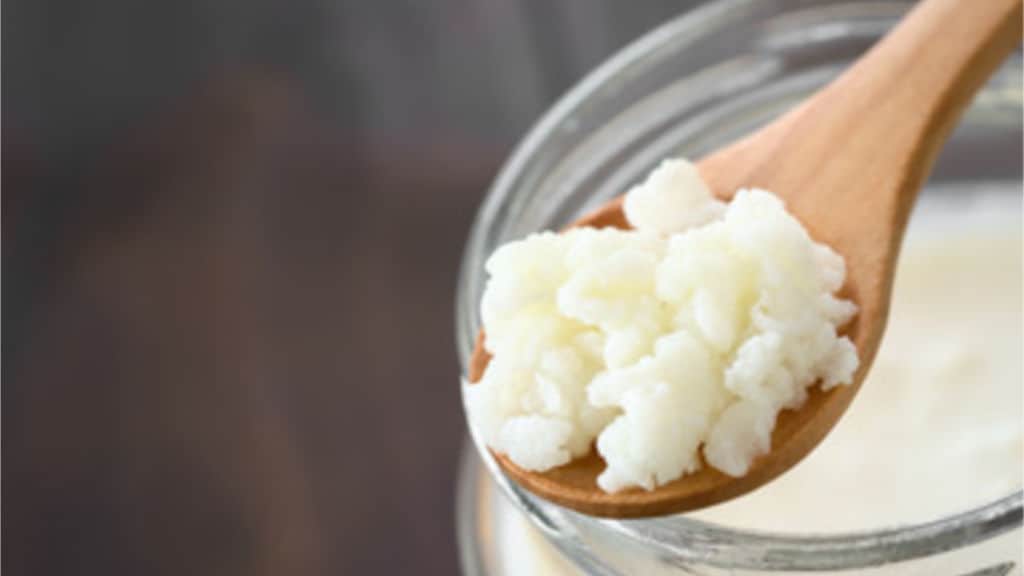Kefir has become popular amongst the natural health community, and the benefits make it clear why. High in probiotics and nutrients, kefir benefits promote overall health with a focus on gut support. It offers more benefits than other drinks, and it promotes the digestion and absorption of nutrients.
Kefir is a tart and creamy fermented drink that contains many bioactive compounds and good bacteria. This probiotic drink offers many health benefits, making it a common choice for healthy people. It is widely available in stores, or you can make it at home. You might also hear people call it kefir yogurt or kefir milk.
Many of the kefir benefits are still being established, but there are many science-backed benefits already. Adding this drink to your diet (any time of the day) could make all the difference in maintaining a healthy lifestyle. If you’re thinking about adding it to your diet, learn about the many kefir benefits to improve your health.
What is Kefir?
Before learning about the kefir benefits, you should understand what kefir is. It is a fermented milk drink that is similar to yogurt, with a thinner consistency. You can use any milk to make kefir, and some people use coconut water rather than dairy.
 Some of the types of milk you can use include the following:
Some of the types of milk you can use include the following:
- goat
- sheep
- cow
- soy
- rice
- coconut
Kefir is made using starter grains that are a combination of bacteria and yeast. As it interreacts with milk, it creates a fermented drink that boosts your nutrients and promotes health. Since it is fermented, it might taste slightly carbonated but still maintain a creamy consistency.
Much of the kefir benefits are due to its high probiotic content. Probiotics are living organisms that promote gut health and other conditions. While kefir is healthy, there are some risk factors to be aware of for some people.
If you have a milk allergy, you shouldn’t consume kefir. It is safe for those with lactose intolerance, but a milk allergy could pose a problem.
Another thing to consider is that many pre-packaged kefir options contain high amounts of added sugar. The added sugar negates many of the health benefits and could lead to further health issues for you. Try to avoid any kefir that contains high sugar levels so that you can ensure you consume the healthiest option.
Eleven Science-Backed Kefir Benefits
Let’s take a look at all the benefits of drinking kefir milk–it is so good for you!
1. Kefir Is Source Of Many Nutrients
In one six-ounce serving of kefir, you will consume a good portion of your daily recommended values of nutrients. It also contains bioactive compounds that contribute to your overall health. Kefir has a high probiotic content containing more than 50 species of kefir probiotic bacteria and yeasts.
Those aren’t the only nutritional benefits of kefir drinks, though, as it also contains many other nutrients. The nutrient content changes based on the version of kefir you have, but it typically contains decent amounts of:
- protein
- calcium
- phosphorus
- vitamin B12
- riboflavin
- magnesium
- vitamin D
- fat
- vitamin K2
- biotin
- folate
- enzymes
- carbohydrates
- vitamin A
- potassium
2. Kefir Has Antibacterial Properties
This fermented drink contains Lactobacillus kefiri, or L. kefiri, which is a species of healthy bacteria. L. kefiri hinders the growth of pathogenic bacteria, preventing illness from E. coli, Helicobacter pylori, and Salmonella. Additionally, it protects you from getting infections and fights off illnesses.
Kefir also contains kefiran, which is a carbohydrate that has antibacterial properties. Kefiran helps protect you from harmful bacteria, as well, aiding L. kefiri in the process.
3. Kefir Improves Bone Health
Kefir is a beneficial source of calcium and vitamin K2. Vitamin K2 helps with increased calcium absorption in bone cells, improving bone density and preventing fractures. This benefit makes kefir a way to decrease your risk of osteoporosis.
Kefir also contains bioactive compounds that help with calcium absorption and slow bone degeneration. Plus, one cup of kefir typically contains between 300 and 400 mg of calcium. Since the average person should get 1,000 mg per day, this drink can account for a large portion of that.
4. Kefir May Protect You Against Cancer
This drink contains microbiota that can fight cancer by stimulating the immune system and reducing tumor growth. According to a study published in Cancer Management and Research, kefir kills cancer cells and reduces their spread. Their study was specific to leukemia cells, but other studies show that it works with other cancers, too.
As one of the leading causes of death, finding ways to reduce your cancer risk is essential. The probiotics found in kefir help, with research showing it reduces cancer cells by more than 50%.
5. Kefir Promotes Healthy Digestion
Having good gut bacteria in your digestive tract promotes healthy digestion. Research shows that kefir and other probiotic foods help with digestion by restoring gut balance. It can also help after taking antibiotics, which often disrupt digestion by removing all bacteria from the system.
Kefir also prevents and alleviates certain conditions, such as diarrhea, ulcers, Crohn’s disease, and irritable bowel syndrome. It can also help relieve bloating as it helps maintain regular bowel movements.
 6. Kefir Helps Fight Allergy Symptoms
6. Kefir Helps Fight Allergy Symptoms
People that have an over-sensitive immune system tend to get allergies or have allergic reactions. Kefir can help prevent and fight those symptoms, though, as it suppresses the inflammatory responses.
During an allergic reaction, inflammation can disrupt the lungs and air passages. Plus, mucus can build up, further blocking the airways. Kefir reduces these problems, allowing you to breathe and recover after an allergic reaction.
This beverage can also suppress allergic reactions altogether. If you’re prone to allergies, make kefir a regular part of your diet to prevent flare-ups.
7. Kefir Helps In Blood Sugar Control
Research shows that people who consume kefir have lower fasting blood sugar levels than others. They also experienced decreased hemoglobin A1c values, which measure blood sugar over three months. This benefit shows that this fermented milk can help people with diabetes as it helps regulate blood sugar.
8. Kefir Aids In Weight Control
Good gut bacteria promote weight loss in a few different ways. First, it helps synthesize nutrients Vitamin K and some B vitamins. Plus, they help break down fiber that people can’t typically digest.
One study from the European Journal of Nutrition shows that the bacteria L. gasseri prevents weight gain and fat accumulation. Researchers also found that it can reduce lipogenic genes and triglyceride levels. Another study from the British Journal of Nutrition found that people who consumed L. gasseri lost more weight than others.
Additionally, consuming kefir can reduce total cholesterol levels, helping control obesity. Since obesity is linked to a gut bacteria imbalance, kefir can help you take control and become healthy again.
9. Kefir Supports Skin Health
Your skin is the largest organ, so keeping it healthy is essential to your overall health. Kefir supports skin health by increasing the good bacteria in your skin. This increase helps with systemic skin issues, and it can help you recover from burns or rashes.
Additionally, the carbohydrate kefiran, found in kefir, helps promote skin health as well. Research shows that kefiran improves skin quality and wound healing, and it can protect connective tissue.
10. Kefir Improves Your Lactose Intolerance Symptoms
Many people can’t break down and digest lactose, leading to lactose intolerance. The lactic acid bacteria in this fermented beverage turns the lactose into lactic acid, though. Plus, they contain enzymes that promote the breakdown of lactose even more.
When you drink this beverage, symptoms of lactose intolerance won’t be as severe because the lactose has already partially broken down. Some people don’t experience any lactose intolerance symptoms at all due to pre-digestion.
Even better, though, is that studies show regularly consuming kefir improves lactose digestion over time. Eventually, it could help you overcome the intolerance altogether due to the wide range of bacterial strains and nutrients. With nearly 65% of people struggling to digest lactose, this information can be life-changing for many.
11. Kefir May Reduce Inflammation
Inflammation can cause or be the result of many conditions and diseases. Kefir can reduce inflammation, resulting in a decreased risk of developing certain issues. Plus, the inflammation reduction can ease the symptoms of conditions you already have, such as rheumatoid arthritis or irritable bowel disease.
 Final Thoughts on the Science-Backed Kefir Benefits
Final Thoughts on the Science-Backed Kefir Benefits
The kefir benefits are plentiful, giving it an advantage over regular milk. Plus, with less lactose, it is safer for more people to drink all of the nutrients. Since this fermented beverage is becoming more popular, it is easy to find, but you can make your own.
If you make your own, make sure you do it properly because it could make you sick otherwise. With a consistency similar to drinkable yogurt, it might take some getting used to, but you’ll learn to love it. As it supports many health aspects and prevents severe conditions from developing, adding it to your diet right away is essential.
It is safe to drink kefir every day, so keep it on hand to boost nutrients and vitamins. Drink it about an hour or two before bedtime for the best results, but anytime during the day is fine. Once you learn the science-backed kefir benefits, you won’t turn back.


















